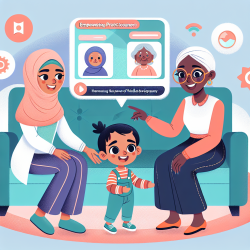As practitioners dedicated to enhancing outcomes for children with hearing impairments, it is crucial to stay informed about the latest research. One such study, "Implicit learning of non-verbal regularities by deaf children with cochlear implants: An investigation with a dynamic temporal prediction task," provides valuable insights that can be directly applied to our practice.
The study investigated whether deaf children with cochlear implants (CIs) can implicitly learn temporal regularities. Implicit learning refers to the unconscious acquisition of knowledge, which is essential for language development and other cognitive processes. The researchers designed a novel task to minimize the load on working memory and visual-motor integration skills, ensuring that the results focused on implicit learning capabilities.
The findings revealed that deaf children with CIs demonstrated comparable implicit learning skills to their typically hearing peers. This suggests that implicit learning may be resilient to early auditory deprivation. However, the study also noted that deaf children showed some weaknesses in inhibitory control, a component of executive function.
For practitioners, these results highlight several key takeaways:
- Implicit Learning Resilience: Despite early auditory deprivation, deaf children with CIs can develop implicit learning skills similar to their hearing peers. This resilience suggests that interventions focusing on implicit learning can be effective.
- Focus on Inhibitory Control: Given the observed weaknesses in inhibitory control, incorporating activities that strengthen executive functions, such as inhibitory control tasks, could be beneficial for deaf children with CIs.
- Data-Driven Interventions: Utilizing data from implicit learning assessments can help tailor interventions that leverage the strengths of deaf children with CIs, while also addressing areas of weakness.
Encouraging further research in this area is also essential. Understanding the nuances of how deaf children with CIs learn can lead to more effective therapeutic approaches and better outcomes. Practitioners are encouraged to stay updated with ongoing research and consider participating in studies that explore the cognitive processes of children with hearing impairments.
To read the original research paper, please follow this link: Implicit learning of non-verbal regularities by deaf children with cochlear implants: An investigation with a dynamic temporal prediction task.










